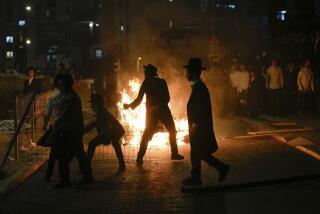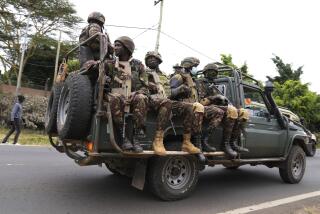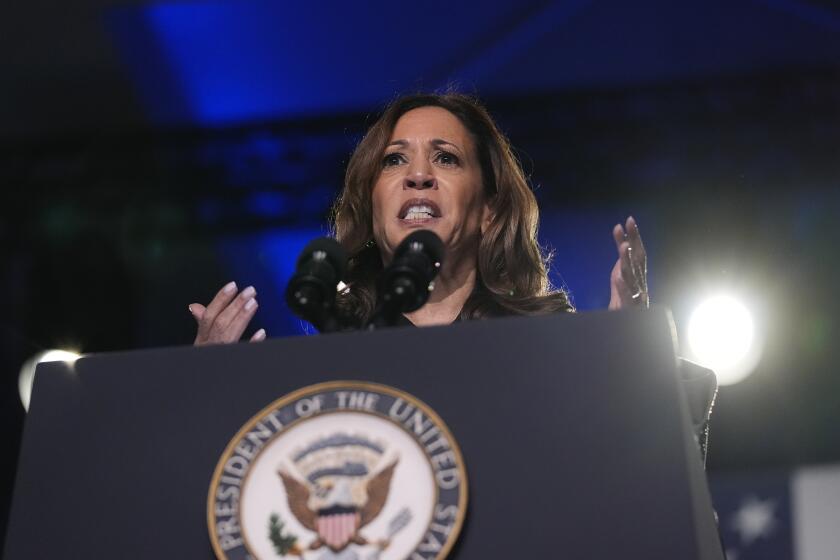Egyptians take protest to palace gates
CAIRO — Tens of thousands of protesters angered by Egyptian President Mohamed Morsi’s expanded powers and a much-criticized proposed constitution drafted by Islamists pressed toward the presidential palace Tuesday as a series of marches dubbed the Final Warning converged in north Cairo.
The protesters at the palace gates provided the starkest sign yet of the country’s deepening political volatility. Dissidents shoved aside a barbed-wire barricade and riot police fired tear gas to push back the crowd.
Morsi, who was at the palace working, left the compound in a convoy as the ranks of demonstrators began to swell.
PHOTOS: Thousands march on Egypt’s presidential palace
“If the people approve of Morsi’s actions, then they are signing on to be slaves,” Nabil Zaki, an opposition figure, said outside the palace walls. “We won’t negotiate with him anymore. We will hit the streets. Expect a united opposition. Expect nationwide strikes, and a working class that will also hit the streets to say no to Morsi and the Muslim Brotherhood.”
The palace protest aimed to boost the pressure on Morsi and the Brotherhood. Morsi angered much of the country last month when he expanded his powers and rushed an Islamist-led constitutional assembly to draft a charter even as the nation’s highest court was expected to dissolve the body over questions of legitimacy.
The draft will go to a national referendum Dec. 15, despite complaints by liberals and secularists that it is tilted toward Islamic law and does not protect civil rights and freedom of expression. The document has agitated the nation’s political divide and has activists calling Morsi a pharaoh and a dictator, the same slurs they used against deposed autocrat Hosni Mubarak.
“We are under the rule of the Brotherhood, not Morsi. Each and every promise he made has been broken,” said May Kamel, a businesswoman waving Egyptian flags. “He has done the opposite of everything he vowed to fulfill as president. There will be blood, but we are willing to face this. The Brotherhood won’t give this up that easy; they’ve wanted this for 80 years.”
Her comments echoed those from the uprising in Cairo’s Tahrir Square that brought down Mubarak in February 2011, when protesters battled the president and his much-feared police state. But Tuesday’s rally suggested that security forces are less loyal to Morsi and more reluctant to use force against peaceful demonstrators. Police retreated behind the palace gates after firing at least two tear gas canisters.
Protesters said they saw Morsi leaving shortly afterward. A presidential spokesman said the president did not flee, but left after his meetings for the day had finished. The Brotherhood’s secretary-general, Mahmoud Hussein, downplayed the protest, falsely telling a TV station the demonstrators were “a small group with no political weight whose numbers don’t exceed 2,000.”
The march was a key barometer for the opposition and Morsi. Dissident leaders are looking to replicate the spirit and momentum that propelled the revolution against Mubarak. Nearly two weeks of protests in Tahrir Square by students, professionals, workers and families have hardened sentiments against Morsi and the Muslim Brotherhood but not enough to force the president to rescind his near-absolute power.
However, Morsi risks further alienating Egyptians increasingly suspicious of the Brotherhood’s ambitions. His sidelining of the nation’s judiciary — hundreds of judges are on strike in protest — further marred his questionable democratic credentials. But the Brotherhood appears to have calculated that it can outlast the demonstrations until the Dec. 15 constitutional referendum.
Morsi has vowed to rein in his powers after a charter is adopted, opening the way for parliamentary elections early next year. The danger for him is a referendum defeat. He would have the power to form a new constitutional assembly, but such a setback would indicate that the Brotherhood, known for its organizational prowess, was losing its political credibility at a time when it has portrayed itself as the leading voice in a new Arab world.
Opposition leaders, including Nobel laureate Mohamed ElBaradei, are split on whether to boycott the referendum, which would almost guarantee Morsi a victory, or urge followers to vote no and risk coming up short while giving the vote an air of legitimacy.
The Brotherhood inherited a splintered country marred by severe economic problems. Its divisions, mainly between Islamists and secular and liberal forces, have sharpened as Morsi has grown more authoritarian. Twelve newspapers and five TV stations announced a strike Tuesday with the symbol of a figure wrapped in newspapers chained in a prison cell.
The Egypt Independent’s website was black Tuesday except for these words: “You are reading this message because Egypt Independent objects to continued restrictions on media liberties, especially after hundreds of Egyptians gave their lives for freedom and dignity.”
Morsi has said his expanded powers are necessary to overcome resistance from Mubarak-era judges he claims are disrupting the country’s political transition.
But protesters, many of whom are Western-educated, rich and worried about Morsi’s Islamist tendencies, say he has gone too far and is jeopardizing the country’s fragile democracy.
“Morsi talked about revolution, yet he broke every promise he’s made. He lied about everything and he’s lying now,” said Nahed Hammad, a homemaker. “You can’t be a temporary dictator. We are willing to escalate this no matter what. Even if the country falls … it’s better than letting Morsi and the Brotherhood run away with it.”
Abdellatif is a special correspondent.
More to Read
Sign up for Essential California
The most important California stories and recommendations in your inbox every morning.
You may occasionally receive promotional content from the Los Angeles Times.











